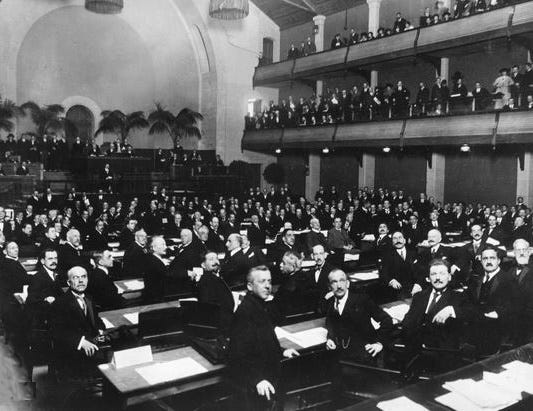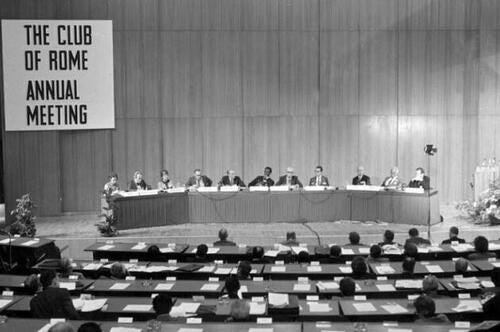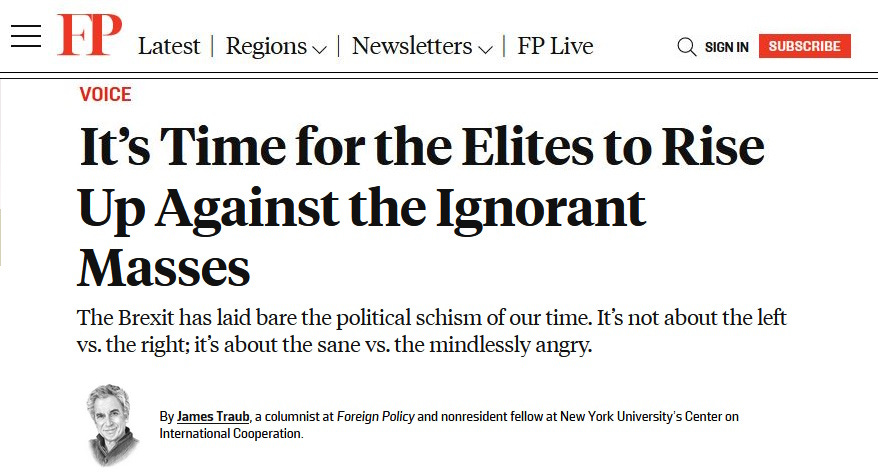On The Origin Of (The Globalist) Species
The current breed of technocratic tyrants, with their delusions of ruling over all of Nature and mankind, spawned back in the early 1970's
Preface
Many were shocked at the speed with which nations closed ranks to implement draconian global control measures at the start of the pandemic.
So to fight back for human liberty and culture, we must try to get inside the heads of our would-be digital captors.
💪💓🦘💪💓🦘💪💓🦘💪💓🦘💪💓
At its core the globalist mindset can be characterised simply as a condition of pathological lust for total control of the world.
This lust necessarily includes a strong element of population control.
And in their case, this has usually meant population reduction.
Much of this eugenic imperative sprang from the early writings of a man by the name of Thomas Malthus.
Malthus was an influential Anglican cleric and economist. He lectured at the East India Company College about the population and food supply of India.
At the time India had 30 million people, and starvation and famine were endemic.
Malthus analysed this situation and created models that predicted that Western nations inevitably would see the same levels of starvation as their populations grew.
Instead, India grew from 30M to 1.4 billion people, and today is a food exporter.
In Malthus’ own time his ideas began to be ridiculed, and he served as the model for Ebeneezer Scrooge in Dickens’ A Christmas Carol.
Today’s economists are completely dismissive: “the Malthusian hypothesis is rendered irrelevant due to a fatal disregard for technological advancement”.
But despite having been proven spectacularly and categorically wrong, Malthus’ pessimistic theories about the evils of population growth still provide the intellectual underpinnings for our current crop of eugenicist institutions.
These include Planned Parenthood, the Rockefeller Foundation, The Ford Foundation, the Wellcome Trust, and the Bill & Melinda Gates Foundation (which originally was called the Bill & Melinda Gates Population Control Foundation). Among many others.
To be clear: these organisations have as a goal the reduction of the number of people on Earth.
The next founding myth of today’s globalists is that the world is becoming too technologically advanced and complex for self-government to continue.
An elite class of technocratic experts with absolute power, their argument goes, is therefore now necessary in order for mankind to survive future challenges.
The writer N.S. Lyons has categorised the main pillars of this belief system.
1. Technocratic Scientism
This is the belief that everything, including society and human nature, can and should be fully understood and controlled through scientific and technical means.
The spiritual, mysterious, mystical, mythical, transcendent, or divine can play no role.
In this view everything consists of systems which operate, as in a machine, on the basis of scientific laws that can be rationally derived through reason.
Humans and their behavior are the product of the systems in which they are embedded. “Social science” functions in the same way as the physical sciences.
These systems can therefore be socially engineered to be improved.
Those with superior scientific and technical knowledge are thus those best placed to understand the cause and effect governing society, and therefore to run it.
2. Utopianism
This is the belief that a perfect society is possible – in this case through the perfect application of perfect scientific and technical knowledge.
The machine can ultimately be tuned to run flawlessly.
At that point all will be completely provided for and therefore completely equal, and man himself will be entirely rational, fully free, and perfectly productive.
History now takes on moral valence; to “go backwards” is immoral. Indeed even actively conserving the status quo is immoral; governance is only moral in so far as it effects change, thus moving us ever forwards, towards utopia.
3. Meliorism
The belief that all the flaws and conflicts of human society, and of human beings themselves, are problems that can and should be directly ameliorated by sufficient managerial technique.
Poverty, war, disease, criminality, ignorance, suffering, unhappiness, death… none are examples of the human condition that will always be with us, but are all simply problems to be solved.
It is the role of the managerial elite to identify and solve such problems by applying their expert knowledge to perfect human institutions and relationships, as well as the natural world. In the end there are no tradeoffs in this, only solutions.
4. Liberationism
The belief that individuals and society are held back from progress by the rules, restraints, relational bonds, historical communities, and inherited traditions of the past.
These are all the chains of false authority from which we must be liberated so as to move forwards.
Old ideas, old culture, old customs, and old habits must all be dismantled in order to ameliorate human problems, as old systems and ways of life are necessarily ignorant, flawed, and oppressive.
Newer – and therefore superior – scientific knowledge can re-design, from the ground up, new systems and ways of life that will function more efficiently and morally.
5. Hedonistic Materialism
The belief that complete human happiness and well-being fundamentally is achievable through the fulfillment of a sufficient number of material and psychological needs and desires.
The presence of any unfulfilled desire or discomfort indicates the systemic inefficiency of an un-provided good that can and should be met in order to move the human being closer to a perfected state.
For the individual, consumption that alleviates desire is a moral act.
Scientific management can and should therefore to the greatest extent possible maximize the fulfillment of desires.
6. Homogenizing Cosmopolitan Universalism
The belief that:
All human beings are fundamentally interchangeable and are members of a single universal community;
That, while perhaps quaint and entertaining, any non-superficial particularity or diversity of place, culture, custom, nation, or government structure anywhere is evidence of an inefficient failure to successfully converge on the ideal system; and
That any form of localism, particularism, or federalism is therefore not only inefficient and backwards but an obstacle to human progress and so is dangerous and immoral.
Progress will thus always naturally entail centralization and homogenization.
Lyons describes the context this new ideology seeks to displace:
“Combined, the promotion of these managerial values served as a convenient ideological means for the managerial system to challenge the existing ethic and values of the middle-class bourgeois order that preceded it.”
“These bourgeois values consisted of a mix of conservative and classical liberal values.”
Nowhere were these values more distinct than in America, where they had developed into a recognizable blend that included:
a strong preference for local governance, grass-roots democracy, and an aversion to top-down control;
an accepted diversity of regional and local folkways and traditions;
a general mythic ideal of spirited individualism and energetic self-reliance;
a countervailing tradition of tight-knit family life and exceptionally widespread participation in a proliferation of religious, community, and civic associations and affiliations (as most famously described by Alexis de Tocqueville);
“Protestant work ethic,” and an attention to thrift and self- discipline as moral virtues;
an intimate connection to the land, and a very strong attachment to middle-class property ownership as central to republican self-governance and the national character;
political realism and a conservative aversion to too rapid and radical change.
Woodrow Wilson was America’s first technocratic globalist president
Wilson was a Social Darwinist and eugenicist who said that The Declaration of Independence “amounted to a lot of nonsense about the inalienable rights of the individual”.
Wilson set up the scaffolding of the new managerial control state in America, including the federal income tax, the Federal Reserve Bank, the Federal Trade Commission, and the Federal Department of Labor.
“Seeing every day new things which the state ought to do, the next thing is to see clearly how it ought to do them. Administration lies outside the proper sphere of politics.”
But what did Wilson mean by “administration” anyway?
By this he meant that all the affairs of the modern state, all the “new things the state ought to do,” should be placed above any vulgar interference from the political.
In other words, it should be above any democratic debate, choice, or accountability, and instead turned over to an elevated class of educated men whose full-time “profession” would be ruling the rabble.
Wilson is also known for the first failed attempt at establishing one world government, the League of Nations.
A polycrisis in banking, currency, inflation, and energy in the early 1970’s presented the ideal opportunity for the technocrats to ratchet up their power grab.
In 1968 the United Nations spawned an offshoot called The Club of Rome, whose book The Limits of Growth was the blueprint for a generation of technocratic ideologues.
For context, the Secretary-General of the United Nations for a decade at the time was a gentleman by the name of Kurt Waldheim.
Mr. Waldheim is shown in his previous career role in the middle below.
The speciality of The Club was to argue the urgency of taking away the right of countries to make their own decisions for the good of their own inhabitants.
As then-cub reporter Robert Hughes saw in this 1973 ABC News story entitled “Computer Predicts The End of Civilisation”:
What The Club (and the world’s elite) wanted was
What they needed was
That would compel people not only to willingly hand over control of their countries and their lives, but to believe that it was in their own best interests to do so.
Club founders later reminisced about finding the perfect cover story for their plans.
“In searching for a common enemy against whom we can unite, we came up with the idea that pollution, the threat of global warming, water shortages, famine and the like, would fit the bill.”
“All these dangers are caused by human intervention in natural processes, and it is only through changed attitudes and behaviour that they can be overcome. The real enemy then is humanity itself.”
We’ll just pause and let that last line sink in a little.
Or, put another way
20 years into their global eco-fascist jihad, the Club produced a document of breathtaking hubris entitled The First Global Revolution.
This manifesto is by turns
Apocalyptic
“Only if all inhabitants of the planet realize that they are facing immediate and common extinction can a universal political will be generated for common action to achieve humanity’s survival. Time is running out.”
Communistic
“Market mechanisms alone cannot cope with global problems that require a long-term strategic approach or involve distributional issues. They cannot by themselves solve problems related to energy, environment, or fairness.”
Globalist
“A further feature of the geopolitical scene is a belated recognition of the essentially global nature of many of the contemporary problems, which cannot be solved or even approached realistically by individual countries in isolation.”
And Anti-Democratic
“As now practiced, democracy is no longer well suited for the tasks ahead. The complexity and the technical nature of today’s problems do not allow elected representatives to make competent decisions at the right time.”
But in 2016 there came a mighty disturbance in The Force
Whatever else you may think about the man, he did pull America out of the Paris Climate Accords, the W.H.O., and other globalist arrangements.
This caused a spasm of panic among the globalist overlord class.
Wokeism to the Rescue of the Globalists
The managerial technocrats quickly recognised that the Woke ideology represented an ideal tool for destroying their enemies and extending their power and control.
“For the managerial elite, Woke provides a swollen portion of the population who, with every new expansive claim to infantile victimhood, constantly beg the technocratic state and its proxies to step in to enforce “justice” and manage the emergency of their individual right to “safety” in every circumstance.“
The regime views this ideology as providing a convenient new source of legitimacy at a time when that legitimacy was being threatened.
Now every sector of the regime is necessary to ensure “equity” (equality of outcomes) between individuals in all respects (social justice), and to protect them from evil opposition to social justice.
And now the bourgeoisie, the working and middle class, those perennial enemies of the global elite, can be branded as white supremacists and all other manner of ‘phobes.
Who can then be righteously beaten down and tormented and isolated and surveilled and dispossessed anew for their deplorable bigotry and hatred.
How the tired old class struggle has been reinvigorated to provide such delicious new moral delights.
We want to close on a positive note
But we can’t. Resist.
💪💓🦘💪💓🦘💪💓🦘💪💓🦘💪💓
Addendum
Upon reflection, we decided there definitely are some reasons for optimism.
Here, an incredibly un-self-aware WEF lady lays out the bad/good news:
And as a reminder, here is what happens when people have had enough of the technocratic tyrants (in this case the Chinese Covid police, in white)
Addendum 2
Interview With a Psychopath
Dennis Meadows was a principal author of the Limits to Growth book.
This modern-day Malthus preaches a gospel of global doom:
Addendum 3
People are slowly getting up the curve, this graphic just popped up in our LinkedIn feed:
































This is brilliant, thanks for sharing it with us. It gets me wondering about when and which of our political leaders in Australia started to get on the Wilson train. The era of Bruce, Scullin and Lyons seems like a good place to start looking. The establishment of institutions that are beyond politics is such a profound topic and you really made that point well.
This is a great informative article, as usual! So much info, that I have to read it again. Maybe three times again. Thank you so much.
I am with you in saying that it’s hard to be positive. I’ve been feeling very negative all day, and it’s no hangover-I’m too old to drink. I’d dehydrate into a speck of dust. God may gather me up if that happens! Naaaw-we’re all here at this time for a reason. Hard to figure the reason-doesn’t matter. Keep on keeping on, and we will be enlightened.
Thank you again for your work. 🥹 🙏